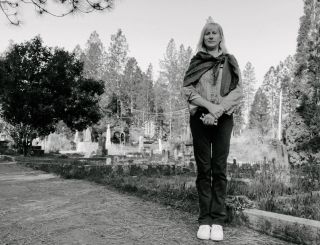Grief
What I Learned From a Week Contemplating My Death
A Personal Perspective: There’s nothing as powerful as death to connect you to life.
Posted April 30, 2024 Reviewed by Abigail Fagan
Key points
- The death of a loved one is not an experience we can or should expect to ever fully “recover” from.
- It is not easy to talk about, confront, or be with our own death.
- By contemplating our own death, we can learn how to live more fully.
The cemetery was very old, with looming concrete gravestones covered in green iridescent moss. Many of the names on the stones were so deeply weathered and worn that I couldn’t read who had been laid to rest underneath them.
The group of us who were spending the week together in an end-of-life practitioner training—contemplating our deaths through meditations, visualizations, conversations, a trip to the morgue, and plans for our burials—made our way along the overgrown path to a shady spot. We each picked a grave and laid our blanket over it. Mine had a large cross at the top and held two people laid to rest. I picked it because of the cross. Though I’m not religious, I love the rituals and talismans of the world’s religions. I can easily understand the human need for purpose, life guidelines, and a sense of the holy.

One by one, my fellow death friends found their stones, and our teacher took her place by a human-size tombstone, with a cross that reached toward the sky. Birds chirped, insects flew, leaves whispered in the wind, as we lay silently and still on top of our graves, awaiting the meditation.
I was surprised by the sense of calm and care as I lay, eyes closed, on my gravestone. I didn’t know what to expect, but I felt a sense of peace, which is not my usual temperament.
In the meditation, we imagined our bodies dying and our souls sitting next to our bodies as they underwent the process of decomposition and returned to the earth. I felt I was sitting vigil lovingly next to my body as it became cold, stiff, bloated. I stayed next to it as it became food for maggots, birds, and other scavengers. I felt a sense of gratitude, of love, for this body that had taken me to so many places, and a sense of awe as it became something foreign to me but also remained very familiar, despite the radical transformation I imagined it undergoing. Eventually it became a collection of bones and dust that scattered. I stayed there watching, keeping my own vigil.
When I opened my eyes, the colors of the leaves were brighter, the sounds more distinct and delightful. My body, which I was still privileged to inhabit, felt heavier, fuller. I felt a deeper sense of embodiment and a greater presence where I was—in this cemetery but also in my life.
I came to death work through trauma and tragedy. My very best friend, my ride or die, died in a plane crash on March 29, 2001, when we were 21 years young, when our lives were laid out in front of us, full of potential and possibility. My life path continued after March 29, but hers hit a dead end. I will never fully recover from that loss. My grief continues to ride shotgun, its presence always near. Even when I haven’t consciously thought of her or my loss, it’s here. Always.
It's become a bit of a blessing and a curse. I learned that bad things happen to good people. That life can change in an instant. That life ends. Because we were so close, this experience taught me that death will come for me too. It most likely will not be in a plane crash, but it will happen. My continually aging body will cease to breathe, pump blood, and perceive my surroundings.
You may think this is the curse, but I feel it is the blessing. The curse was losing my friend. The blessing is that she taught me that while she is dead, I am alive, and I will one day be dead too.
I have learned there’s nothing like death to connect you to life.
In her new book, Briefly Perfectly Human, Alua Arthur talks about how a near-death experience, followed by an intimate friendship involving many honest conversations about death with a young woman living with cancer, lifted her out of serious clinical depression and into a cherished relationship with life.
Death can do that. But it’s not easy to talk about, confront, or be with our own death.
I used to experience great difficulty conceptualizing my own death. I felt tremendous heartbreaking grief about my own life ending, especially when I thought about saying goodbye to my two young children and beloved husband. The decades I spent wondering about death produced an existential loneliness that has kept me awake in the darkness on more nights than I can count.
The week I spent contemplating my death was hard; however, I feel differently about my death now. It’s not that I feel zero sadness or grief. It’s not that I have no fear. It’s not that I’m any less heartbroken. I remain all those things. But I have found—or maybe cultivated—a true love of life that somehow holds all the other hard-to-hold, painful parts. I feel more embodied, more alive.
Before the week of confronting my death, I treated everything with the same level of urgency—whether it was making a dental appointment or purchasing socks for my son, or it was talking with my mom about our deaths. If a client cancelled, I filled the free hour buying essentials online for my family or catching up on my never-ending emails. I believed clearing that inbox was essential to my well-being, that keeping up with my life admin tasks would offer me peace.
To be clear, I don’t fault myself for this. I simply wasn’t connected to the reality of how impermeant my time here is. Or my mom’s time. I wasn’t able to acknowledge that my body is aging and will never be this young again. I was sweating the small stuff so much that I didn’t recognize the enormity of other things—like slowing down to gaze into my husband’s hazel eyes in the kitchen as we prepare the kids’ breakfast. Or stopping to watch the clouds as they drift across the sky. Or making that call to my mom.
The end of my week-long contemplation of death felt more like a beginning than an ending. It wasn’t a one-and-done kind of exercise. I need to continue to be with and befriend my death and to nurture and embody my new awareness. Even in this moment, I find myself on the edge of discovery—as I listen to the mournful cry of the mourning doves outside my window, as I feel my stomach move with my breath and my heart beating in my chest. This, I know more clearly now, is what it means to live.
References
Arthur, A. (2024). Briefly perfectly human: Making an authentic life by getting real about the end. Mariner Books.




